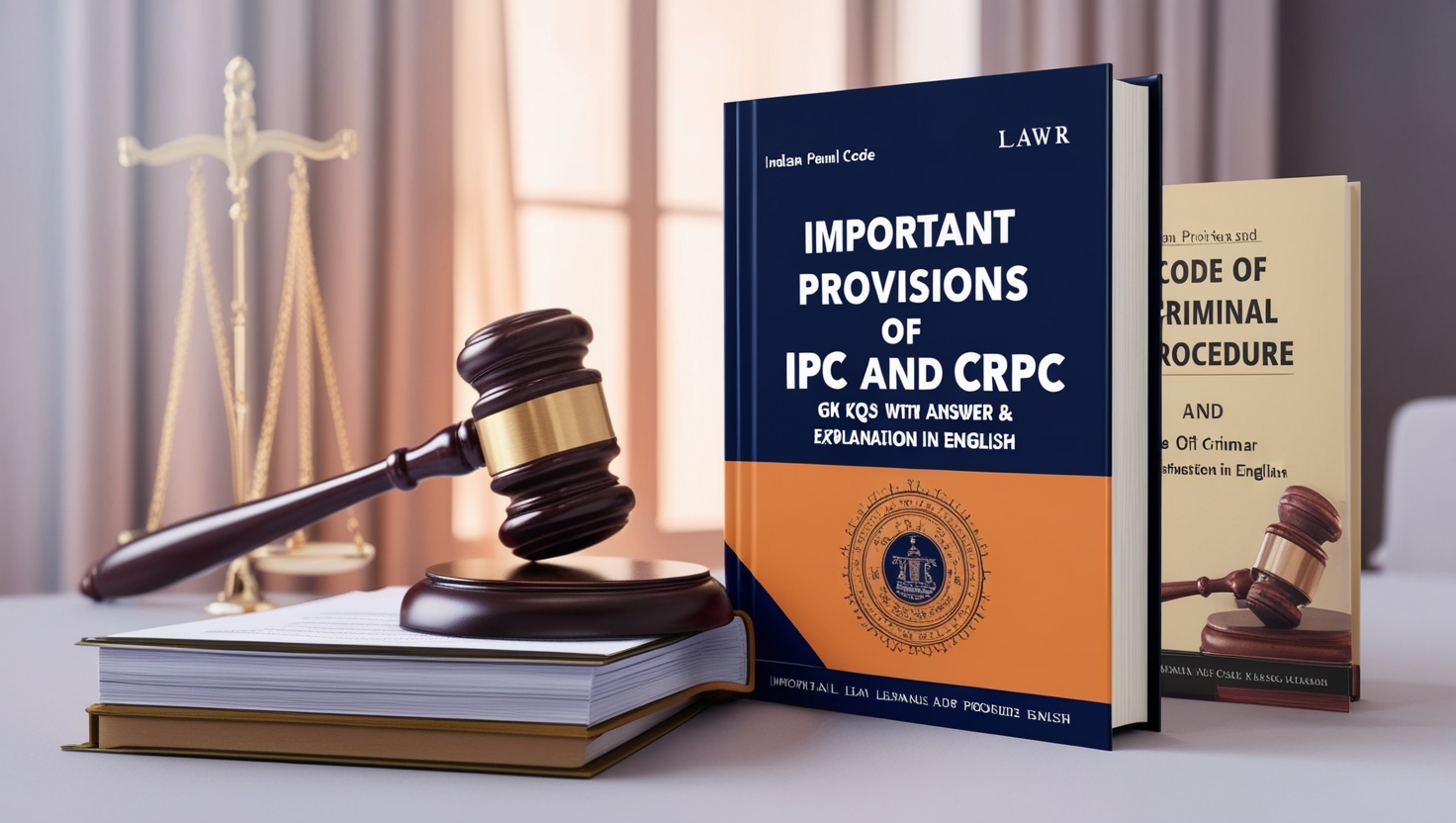
The article Important Provisions of IPC and CrPC GK MCQs With Answer & Explanation in English provides a comprehensive set of multiple-choice questions (MCQs) designed to help readers understand key provisions of the Indian Penal Code (IPC) and Criminal Procedure Code (CrPC). This guide will not only test your knowledge but also offer detailed answers and explanations to help you grasp these legal concepts effectively.
Ideal for competitive exams and law enthusiasts, this article focuses on important provisions in an easy-to-understand format.
1. Criminal Law of India is codified in which of the following?
- Indian Penal Code, 1860
- Criminal Procedure Code, 1973
- Both A and B
- Neither A nor B
Show Answer
Answer: Indian Penal Code, 1860
The Indian Penal Code, 1860, is indeed the substantive law that deals with various criminal offenses in India. It defines and classifies these offenses, along with their punishments.
2. Which of the following persons do the courts have no jurisdiction to try, even if they have transgressed the provisions of the Penal Code?
- President
- Governors
- Ambassadors
- All of the above
Show Answer
Answer: All of the above
Courts in India do not have jurisdiction to try certain high-ranking officials such as the President, Governors, Ambassadors, and certain other dignitaries, even if they have transgressed the provisions of the Penal Code. These officials enjoy immunity from prosecution while in office.
3. Which of the following represents the physical aspects of a crime?
- Actus reus
- Mens rea
- Both A and B
- Neither A nor B
Show Answer
Answer: Actus reus
Actus reus and mens rea are fundamental concepts in criminal law. Actus reus represents the physical elements or actions of a crime, while mens rea refers to the mental state or intent of the offender. Both elements are necessary to establish criminal liability. Actus reus alone is not sufficient; there must be a guilty mind (mens rea) accompanying the criminal act.
4. Which of the following represents the mental aspects of a crime?
- Actus reus
- Mens rea
- Both A and B
- Neither A nor B
Show Answer
Answer: Mens rea
Mens rea, which refers to the mental state or intent, is indeed an essential element in determining criminal liability. The guilty mind or criminal intent of the offender is crucial in establishing their culpability.
5. Which of the following is not punishable under the Penal Code?
- Actus reus
- Mens rea
- Both of them
- None of them
Show Answer
Answer: Mens rea
Mens rea, which refers to the mental state or intent, is not punishable under the Penal Code. Only the actus reus (physical act) can be subject to criminal liability.
6. Which of the following statements is true about the fundamental principle of penal liability?
- Actus non facit reum, nisi sit rea is the principle.
- A person is not in fact guilty itself is not criminal unless accompanied by a guilty mind.
- Both of them
- None of them
Show Answer
Answer: Both of them
The statement “It means a fact itself is not criminal unless accompanied by a guilty mind” is an accurate representation of the legal principle. This principle is known as “Actus non facit reum, nisi sit rea.” In essence, it means that the mere commission of a physical act does not make a person criminally liable unless there is also a guilty mind or intent associated with the act.
7. Which of the following are the stages of a criminal offence?
- Intention
- Preparation
- Attempt
- All of the above
Show Answer
Answer: All of the above
The stages of a criminal offense typically include intention, preparation, attempt, and completion. These stages may all be relevant in determining criminal liability, depending on the specific elements of the offense.
8. For which of the following offences is mens rea not essential?
- Waging war
- Robbery
- Both A and B
- None of them
Show Answer
Answer: Waging war
Mens rea, which refers to the guilty mind or criminal intent, is not essential for the offence of waging war. The act of waging war itself, regardless of the mental state or intent of the person involved, can lead to criminal liability. In contrast, for the offence of robbery, mens rea is essential. Robbery typically involves an intentional act to take someone’s property or belongings by force or threat, and the guilty mind or intent to commit the act is a crucial element of this offence. So, the correct answer is “Waging war.” Mens rea is not essential for the offence of waging war, but it is essential for robbery.
9. Which among the following are essentials of the ‘attempt’ stage of a criminal act?
- Guilty intention to commit an offence
- No act done towards the commission of the offence
- The act must be a completed offence
- Both A and B
Show Answer
Answer: Both A and B
The essentials of the ‘attempt’ stage of a criminal act are both a guilty intention to commit an offence and some act done towards the commission of the offence. The act must fall short of the completed offence.
10. In which of the cases, presence or absence of a guilty mind is irrelevant?
- Motor Vehicles Act
- Arms Act
- Public Liability Insurance Act
- All of the above
Show Answer
Answer: All of the above
In cases of strict liability offenses, the presence or absence of a guilty mind (mens rea) is indeed irrelevant. The liability is based solely on the act itself (actus reus). Strict liability offenses do not require proof of intent or knowledge on the part of the offender.








Leave a Reply